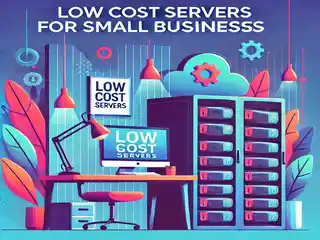A server is important for small businesses. It helps store data, run applications, and ensure everything works smoothly. But servers can be expensive. That’s why low cost servers for small businesses are great. They give you what you need without spending too much money.
What is a Low-Cost Server?
A low-cost server is a budget-friendly server. It’s made for small businesses that don’t want to spend much money but still need a good server. These servers help with many things, like managing data and running business apps.
Why Small Businesses Need Servers
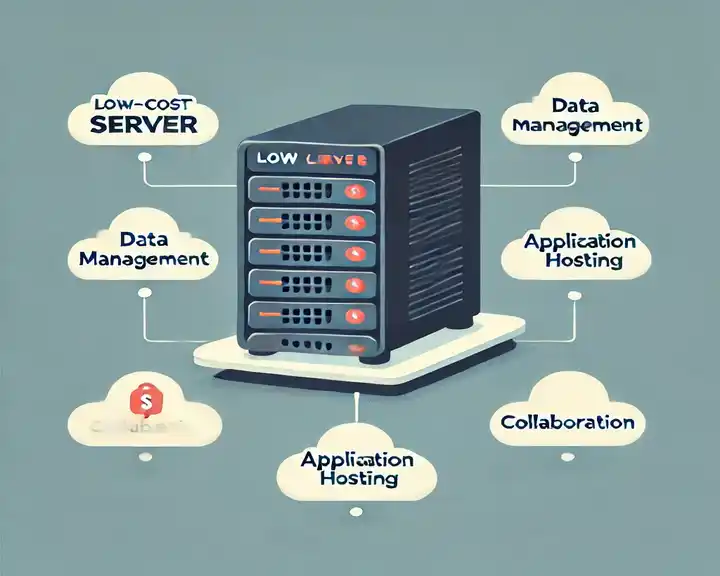
For small businesses, having a server is very helpful. Here’s why:
- Data Management: Servers keep all your business data in one place. This is important for keeping track of information.
- Application Hosting: Many business apps need a server to work well. A cost-effective server makes sure these apps run smoothly.
- Collaboration: Servers help teams work together by sharing files and apps. This is important for small teams working on projects.
- Scalability: Your server needs to grow as your business grows. A server on a budget can scale up as required without costing too much.
Types of Low Cost Servers for Small Businesses
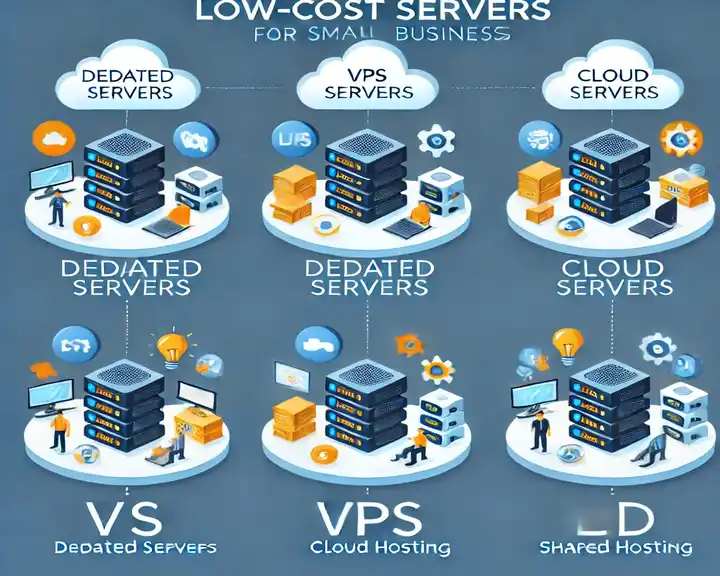
There are different types of affordable servers for small businesses. Here are a few:
- Dedicated Servers: These are for one business only. They are powerful but can be more costly. However, discount server deals can make them affordable.
- VPS (Virtual Private Server): This balances cost and performance well. It’s a virtual server within a physical server.
- Cloud Servers: These are scalable and cost-effective. You pay for what you use, making them a great budget-friendly server.
- Shared Hosting: This is the cheapest option. Many websites share one server. It’s good for very small businesses with minimal needs.
10 Best Low Cost Server Providers for Small Businesses
Choosing the right server provider is very important for your small business. Here are some great options that are both affordable and reliable:
1. Bluehost
Known for its reliable and cheap server options, Bluehost offers shared hosting starting at .95 monthly.
2. HostGator
This provider offers various budget server plans, starting at .75 monthly. HostGator is ideal for businesses looking for affordable and scalable hosting solutions.
3. InMotion Hosting
It provides economical hosting with good customer support. Its shared hosting plans start at .29 monthly, making it a cost-effective option for small enterprises.
4. DigitalOcean
Great for affordable cloud servers, DigitalOcean offers flexible pricing plans that allow you to pay for what you use. Their cloud servers cost monthly, providing scalability for growing businesses.
5. A2 Hosting
Known for its discount server options at good prices, A2 Hosting offers plans starting at .99 monthly. It provides high-performance and various hosting options tailored to different business needs.
6. HPE ProLiant ML350 Gen10
This server is ideal for scalability. It offers a good balance of price, power, and expandability. It’s perfect for businesses that expect to grow and need a server that can scale with them.
7. Fujitsu Primergy TX1310 M1
This server is known for its reliability. It includes 16GB of RAM and 2TB of storage. It’s suitable for small businesses that need strong performance and reliability.
8. HP Proliant Microserver Gen8
This compact and professional server is a good pick for small businesses. Its small size and easy access make it reliable and space-saving.
9. Dell PowerEdge T40
This affordable and fully featured server is perfect for small businesses needing a reliable server for lightweight tasks.
10. Synology DiskStation DS220j
This is an affordable NAS unit for local file storage. It’s great for small businesses looking for simple and effective data management solutions without needing extensive computing power.
How to Choose the Right Low Cost Server for Small Businesses
Here are some tips for picking the right low cost server for your business:
- Assess Your Needs: Know your business needs, like data storage and application hosting.
- Consider Scalability: Choose a server that can grow with your business. Cloud servers are great for this.
- Evaluate Support: Make sure the server provider has good customer support.
- Check Performance: Choose a server that works well and has good uptime.
- Budget: Compare different economical server options and pick one that fits your budget.
Benefits of Low-Cost Servers for Small Businesses
Here are some benefits of using a low-cost server for your small business:
- Cost Savings: Save money and use it for other important things.
- Improved Efficiency: A budget server helps run your business smoothly.
- Better Security: Affordable servers can still have good security features.
- Scalability: Easily scale up your server as your business grows.
- Enhanced Collaboration: Share files and apps easily with your team.
What should we consider when choosing a low cost server for a small business?
When choosing a low cost server, consider the following factors:
- Data Storage Needs: How much data do you need to store?
- Performance: The server’s speed and reliability.
- Scalability: Ability to upgrade as your business grows.
- Customer Support: Availability and quality of support.
- Budget: Cost and value for money.
Setting Up Your Low-Cost Server
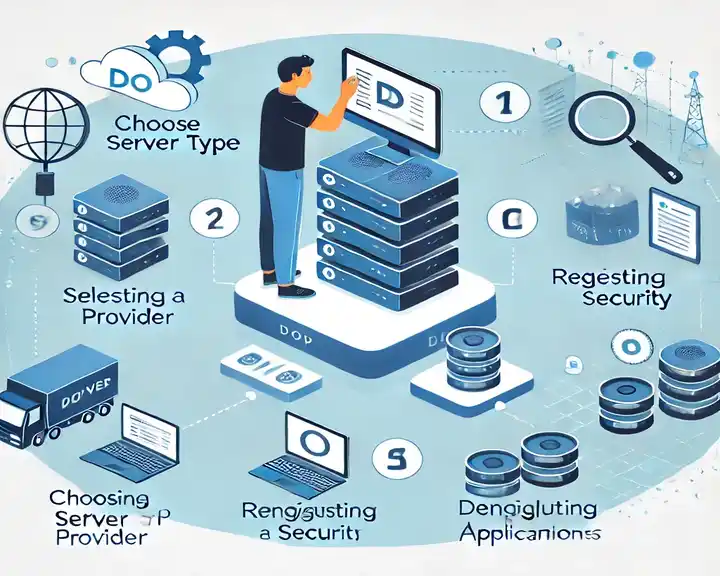
Setting up a low cost server is simple if you follow these steps:
- Choose Your Server Type: Decide if you need a dedicated server, VPS, cloud server, or shared hosting.
- Select a Provider: Pick a reliable server provider like Bluehost, HostGator, InMotion Hosting, DigitalOcean, or A2 Hosting.
- Register Your Domain: If you don’t have a domain name, get one. Many hosting providers offer domain registration.
- Set Up Your Server: Follow the instructions from your hosting provider to set up your server.
- Configure Security: Install firewall software, set up regular backups, and use strong passwords to keep your server secure.
- Deploy Applications: Install the applications you need for your business, like web servers and databases.
- Monitor and Maintain: Regularly check your server’s performance and update the software to keep it running smoothly.
Tips for Effective Server Management
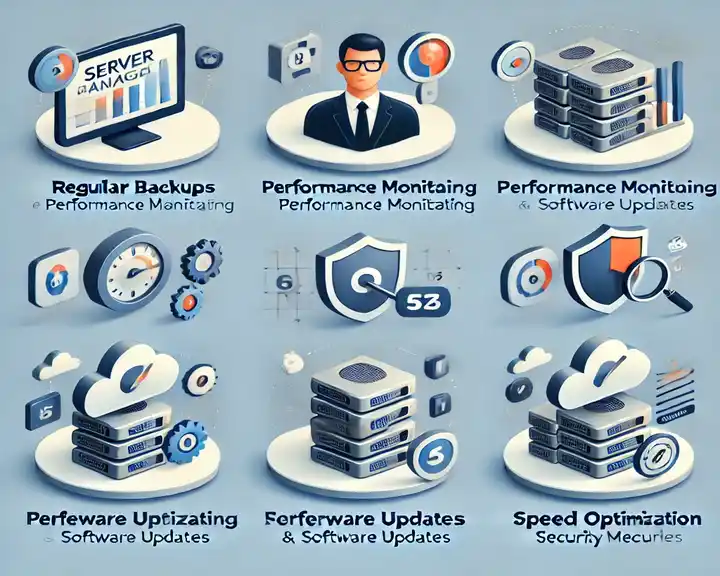
Managing a server well is important for smooth operations. Here are some tips:
- Regular Backups: Always back up your data. This way, you can recover your information if something goes wrong.
- Monitor Performance: Use tools to watch your server’s performance. Fix problems before they affect your business.
- Keep Software Updated: Regularly update your server software to stay secure and get the latest features.
- Optimize for Speed: Ensure your server is fast by using caching, optimizing databases, and reducing the load on your server.
- Security Measures: Use firewalls, anti-virus software, and strong passwords. Check for and fix any security issues regularly.
Common Challenges and How to Overcome Them
While using a low cost server can help your business, it can also have challenges. Here are some common problems and solutions:
- Limited Technical Expertise: If you don’t have technical skills, consider hiring a part-time IT consultant or using managed server services.
- Downtime: Server downtime can be costly. Ensure you have a reliable hosting provider with good uptime guarantees, and consider using a backup server.
- Security Threats: Small businesses are often targets for cyberattacks. Regularly update your software, use strong passwords, and implement security measures like firewalls and anti-virus programs.
- Scalability Issues: As your business grows, your server needs may change. Choose a scalable server solution like a cloud server that can grow with your business.
Success Stories
Many small businesses have used low cost servers to succeed. Here are some examples:
- Startup Tech: Used a VPS from DigitalOcean. It gave them good performance at a low cost.
- Local Bakery: Choose shared hosting from Bluehost. It helped them manage online orders without spending too much.
- Freelance Agency: Used cloud servers from HostGator. It allowed them to grow their client base without high costs.
FAQ
Q: Can low cost servers handle heavy business applications?
A: Yes, many low-cost servers can handle heavy business applications. Options like VPS, dedicated servers, and cloud servers offer the necessary performance and scalability. It’s important to choose a server that matches your application requirements.
Q: Are low cost servers secure?
A: Affordable servers can still provide good security features. Look for servers with built-in firewalls, regular backups, and strong customer support. Providers like Bluehost and HostGator offer robust security even in their low cost plans.
Q: How do I ensure my server can grow with my business?
A: Choose scalable options like cloud servers or VPS to ensure your server can grow with your business. These allow you to upgrade resources as needed easily. Providers like DigitalOcean offer flexible plans where you pay for what you use, making it easy to scale up.
Q: What are the benefits of using a NAS unit like Synology DiskStation DS220j for small businesses?
A: NAS units like Synology DiskStation DS220j are great for local file storage. They offer easy setup, reliable performance, and are cost-effective for small businesses. They help manage data locally without the need for extensive computing power.
Q: How do dedicated servers compare to other types of servers in terms of cost?
A: Dedicated servers are typically more expensive than shared hosting or VPS options. However, they offer higher performance and reliability, making them suitable for businesses with high traffic or specific resource needs. Discount deals can make dedicated servers more affordable.
Q: What is the difference between shared hosting and VPS?
A: Shared hosting involves multiple websites sharing one server, which is cost-effective but offers limited resources. VPS (Virtual Private Server) provides a virtual server within a physical server, offering better performance and more dedicated resources than shared hosting.
Q: Can I switch server providers if my needs change?
A: Yes, you can switch server providers if your needs change. Look for providers that offer easy migration services to ensure a smooth transition. Before switching, it’s important to back up your data and understand the terms of service.
Q: What support options should I look for in a server provider?
A: Look for providers that offer 24/7 customer support, live chat, phone support, and a comprehensive knowledge base. Good customer support is essential for resolving any issues quickly and efficiently.
In conclusion, low cost servers are a great choice for small businesses. They help manage data, run applications, and support growth without costing too much. Choosing the right low cost servers for small businesses and providers allows your business to run smoothly and efficiently.
